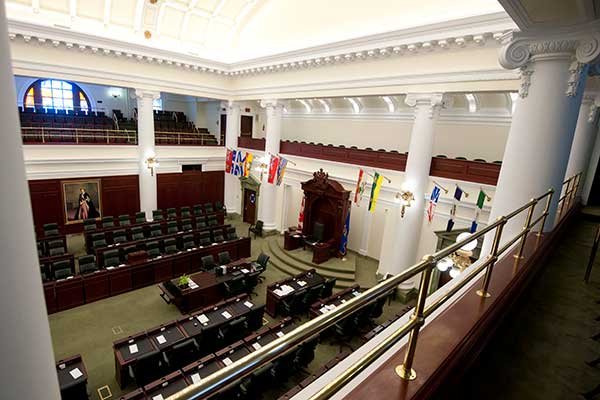In the heart of Alberta, many people care deeply about how their towns and cities are run. Local governments and chambers of commerce often make big decisions that affect jobs, schools, roads, and more. But making these choices isn’t always easy. Meetings can get messy, ideas can be lost, and voices can be ignored.
That’s where parliamentary procedure comes in. It’s a set of rules that helps groups make decisions fairly and clearly. The Ron Chapman Excellence in Governance Scholarship helps people in chambers of commerce learn these skills. This builds better leaders, better meetings, and stronger communities.
Let’s take a look at some of the common problems in local governance and how the right skills can fix them.
Why Parliamentary Skills Matter in Community Governance
Problem – Confusion and Inefficiency in Local Meetings
Many local leaders in Alberta work hard, but they haven’t always been trained in how to run a meeting. When meetings don’t follow proper rules, things can go sideways. People talk over each other. Motions are unclear. Sometimes decisions are rushed or skipped. This can make community members feel left out or frustrated.
Without clear processes, meetings waste time. Even worse, important voices may not be heard. This can lead to poor choices that don’t reflect the whole community.
Solution – Stronger Knowledge of Parliamentary Procedure
Parliamentary procedure gives structure to meetings. It helps members speak in turn, present motions clearly, and vote in a fair way. Everyone knows what to expect, and the meeting moves forward with purpose.
Training in these rules makes a big difference. It allows local leaders to focus on what matters—serving their community. The Alberta Governance Scholarship supports people who want to learn these skills. These leaders return to their chambers with more confidence and a toolkit for effective action.
Strengthening Chambers of Commerce Through Better Governance
Problem – Inconsistent Leadership Practices Across Communities
Not all chambers of commerce in Alberta are the same. Some have strong leadership and steady goals. Others may struggle with planning, participation, or conflict. Often, the difference comes down to leadership experience.
Without training, new board members may not know how to manage bylaws, set agendas, or engage members. This creates confusion, and some chambers fall behind.
Solution – Leadership Development With a Governance Focus
Leadership doesn’t come from guesswork—it comes from learning. That’s why governance training matters. With the right tools, leaders can shape agendas, guide discussions, and lead votes in a way that makes everyone feel heard.
The Ron Chapman Excellence in Governance Scholarship plays a key role here. It helps community members from different chambers grow into strong, steady leaders. With a shared understanding of parliamentary procedure, Alberta’s chambers can work together more smoothly across the province.
Making Local Policy More Inclusive and Transparent
Problem – Low Public Engagement and Confusing Processes
In many towns, people feel left out of the decisions that affect them. Council or chamber meetings might be open to the public, but the language and rules can feel confusing. Sometimes, people don’t know when or how to speak up. This weakens trust in local government.
If folks don’t understand the process, they may stop showing up altogether. This leads to lower turnout at meetings and fewer ideas shared.
Solution – Clear Rules and Active Listening at the Table
When meetings use parliamentary procedure, it becomes easier to follow along. People know when to speak, how to suggest ideas, and how voting works. This opens the door for more voices, especially those who might feel shy or unsure.
Leaders trained through the Ron Chapman Excellence in Governance Scholarship are taught to listen carefully and include everyone. By making space for more voices and explaining the rules clearly, chambers can rebuild public trust and bring more people into the conversation.
The Role of Chambers in Building Regional Policy Influence
Problem – Local Chambers Often Lack Provincial Presence
Chambers of commerce don’t just work locally. They can also influence decisions at the provincial or even national level. But too often, local chambers in Alberta don’t have the tools or unity to speak with a strong voice.
Many good ideas stay stuck at the community level. That’s because chambers aren’t always connected, and they may not know how to turn local concerns into policy proposals.
Solution – United Voices and Trained Leaders in Governance
When leaders are trained in governance, they know how to organize ideas and present them. They also know how to build consensus—getting everyone on the same page. This helps multiple chambers work together and make bigger changes.
Thanks to training opportunities like the Ron Chapman Excellence in Governance Scholarship, more local leaders are learning how to take action. With strong skills in policy discussion, motion-building, and communication, these leaders can speak up for their regions and shape the laws that matter most to them.
Conclusion
Good governance doesn’t just happen at the top. It starts with everyday people in local chambers, town councils, and community boards. In Alberta, the future of local leadership depends on the skills and confidence of those in the room.
The Ron Chapman Excellence in Governance Scholarship is helping build that future. By teaching parliamentary procedure and leadership tools, it gives chamber members the power to lead with clarity, fairness, and vision. Better meetings lead to better decisions—and better decisions build stronger communities.
With more trained leaders stepping up, Alberta’s communities can grow together, making sure every voice counts, every meeting matters, and every vote moves us forward.







